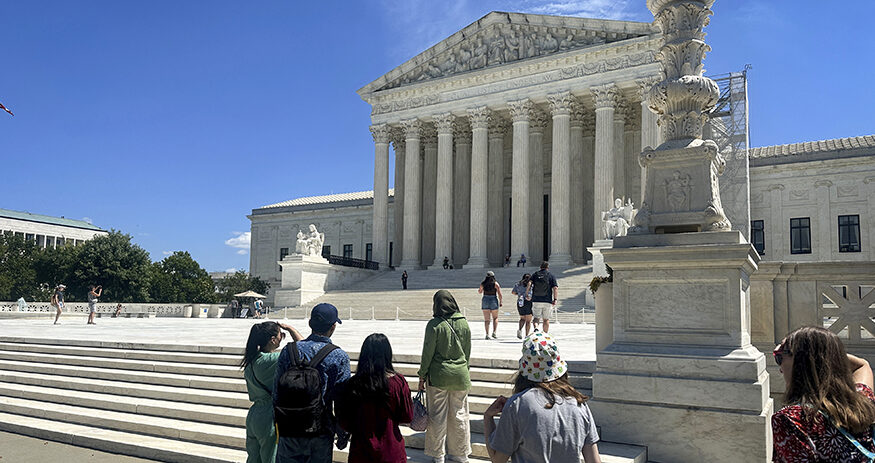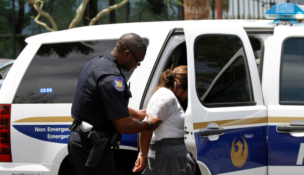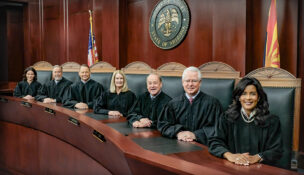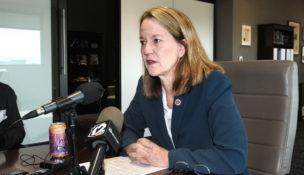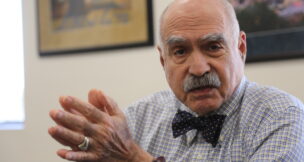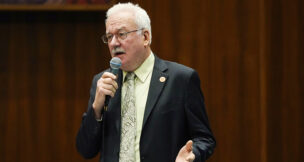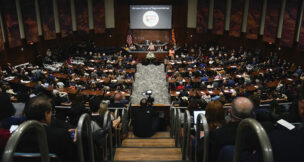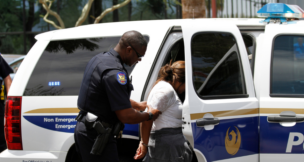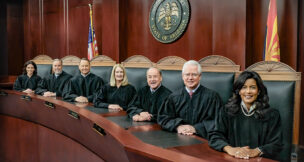U.S. Supreme Court gives Republicans partial victory
Howard Fischer, Capitol Media Services//August 23, 2024//
U.S. Supreme Court gives Republicans partial victory
Howard Fischer, Capitol Media Services//August 23, 2024//
A divided U.S. Supreme Court agreed Aug. 22 to let Arizona block some, but not all, people who don’t provide proof of citizenship when registering from this point forward from voting in this year’s presidential race.
In a brief order, the justices said Arizona is entitled for now to enforce a provision of a 2022 law that spells out anyone who applies to vote using a state registration form from now on must provide “satisfactory evidence of citizenship.” The court said that can continue until a federal appeals court can decide the legality of the statute.
But the justices left in place lower court orders that bar Arizona from requiring such proof from those who sign up to vote using a form designed by the federal Election Assistance Commission.
That form requires only that would-be voters swear, under penalty of perjury, they are eligible to vote. And those who register with that form are entitled to vote only in federal elections.
So that leaves the door open for those who fail to provide such proof to continue to sign up using that federal form between now and the Oct. 7 registration deadline.
More immediately, the court ruling is prospective only. That means the more than 41,000 Arizonans who already are on the rolls as federal-only voters, regardless of which form they used to sign up – still can decide whether they want to cast a ballot for Kamala Harris, Donald Trump or someone else.
And nothing in the decision affects the ability of those who signed up using the federal form who didn’t provide proof of citizenship from voting in the race for U.S. Senate between Kari Lake and Ruben Gallego. State lawmakers conceded years ago they have no authority to regulate in that area.
Ditto in the nine congressional races.
Finally, the justices said the state cannot enforce another law saying those who are federal-only voters must cast a ballot in person. They left in place lower court rulings that the state, having decided people can vote by mail, cannot deny that privilege to some.
Senate President Warren Petersen, one of those who sought Supreme Court intervention, acknowledged that the ruling is only a partial victory.
“While we’re grateful SCOTUS recognized our state’s sovereignty by allowing our laws requiring proof of citizenship to register to vote in Arizona be enforced, individuals who are living here illegally are still able to register on a federal form without providing proof of citizenship,” he said in a prepared statement.
“They must only attest they are lawful citizens,” Petersen said. “Then they are able to vote in the presidential and congressional races, as well as by mail, thus influencing the outcome of our elections.”
That claim of non-citizens voting was echoed in a statement by the Republican National Committee which joined with Petersen and House Speaker Ben Toma to seek Supreme Court intervention. It called non-citizen voting “a major threat to our election security.”
“The corrupt leaders driving non-citizen voting are anti-American leftist radicals set on stopping President Trump and his America First policies,” the RNC statement said. “They want open borders and open elections, because they are counting on illegal votes.”
But no evidence was ever presented in the case showing that the people who have signed up in Arizona without presenting proof of citizenship are, in fact, not eligible to vote.
Aaron Thacker, spokesman for Democratic Secretary of State Adrian Fontes, said there is evidence that the list of federal-only voters includes students attending state universities, many from within the state, who did not bring their birth certificates or other proof of citizenship with them but may have an interest in voting in this year’s high-profile federal and congressional races. He said the ability to sign up using the federal form gives them that option.
And Fontes, in his own statement, emphasized that those who are not yet registered but want to vote in November still have the ability to sign up with the federal form. He even provides a link to that form on his agency’s website.
Since 2004, Arizona has required proof of citizenship to vote in state and local elections.
But that has bumped up against the National Voter Registration Act. It requires that states “accept and use” the form designed by the Election Assistance Commission to let people register to vote in federal elections.
Even the U.S. Supreme Court, in a 2013 ruling authored by Justice Antonin Scalia, said Arizona cannot demand more than what is required on the federal form.
In 2022, however, lawmakers sought to pick a new fight.
Sen. Jake Hoffman, R-Queen Creek, conceded that the state has no control over people registering to vote in congressional races. That is because the U.S. Constitution allows Congress to control the time, place and manner of congressional races.
But Hoffman argued and he got Republican colleagues to agree that the state still has a role to play in who can vote for president.
He bases that on laws that allow each state to choose how to select its presidential electors. And, strictly speaking, when Arizonans cast a ballot, they are voting for a slate of electors pledged to a specific candidate, not for the candidate himself or herself.
That argument carried no water with U.S. District Court Judge Susan Bolton who, in a ruling last year, barred the state from restricting who can vote for president.
“The plain language of the National Voter Registration Act reflects an intent to regulate all elections for federal office, including for president or vice president,” she wrote. “And binding precedent indicates that Congress has the power to control registration for presidential elections.”
Similarly, Bolton said federal law preempts a requirement in the challenged statute that anyone who uses the federal form must provide documented proof of citizenship in order to vote by mail in any race for which they are eligible to vote. She said that’s not what the federal law says.
“Congress recorded that it enacted the National Voter Registration Act not just to establish procedures that will increase the number of eligible citizens who register to vote in elections for federal office, but also to make it possible for federal, state and local governments to implement this chapter in a manner that enhances the participation of eligible citizens as voters in elections for federal office,” Bolton said.
The latest Supreme Court order does not end the fight. It still gives state officials, the RNC and their allies the opportunity to ask the 9th Circuit Court of Appeals to overturn Bolton’s decision, something that would affect future elections.
Aside from the claims by the Republicans about non-citizens voting, the whole issue has other political overtones.
In their legal filings, the GOP challengers pointed out that Republicans make up about 34% of the state’s registered voters. But the latest figures from the Secretary of State’s Office show just 14.3% of these federal-only voters signed up as Republicans.
Another 27.4% are Democrats, with 53.6% listed as “party not designated” and the balance among minor parties.
And all that follows the fact that Trump lost to Joe Biden in Arizona in 2020 by 10,457 votes, far fewer than the number of federal-only voters.

